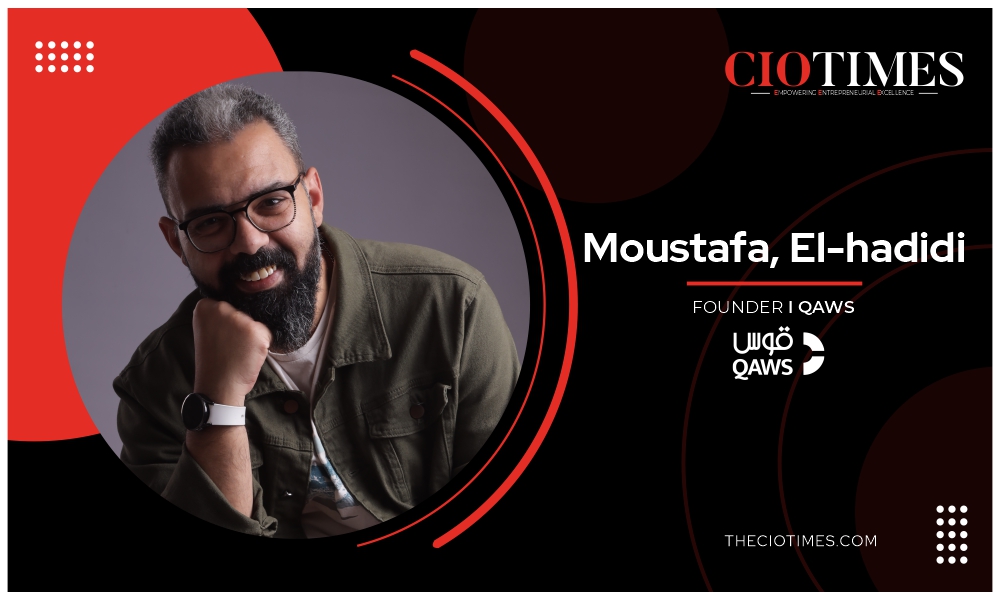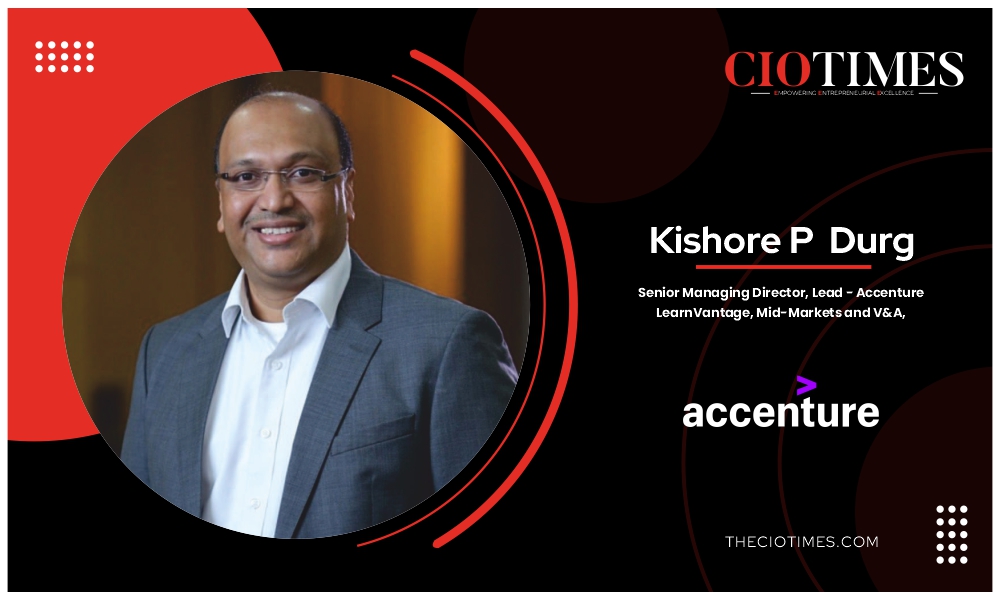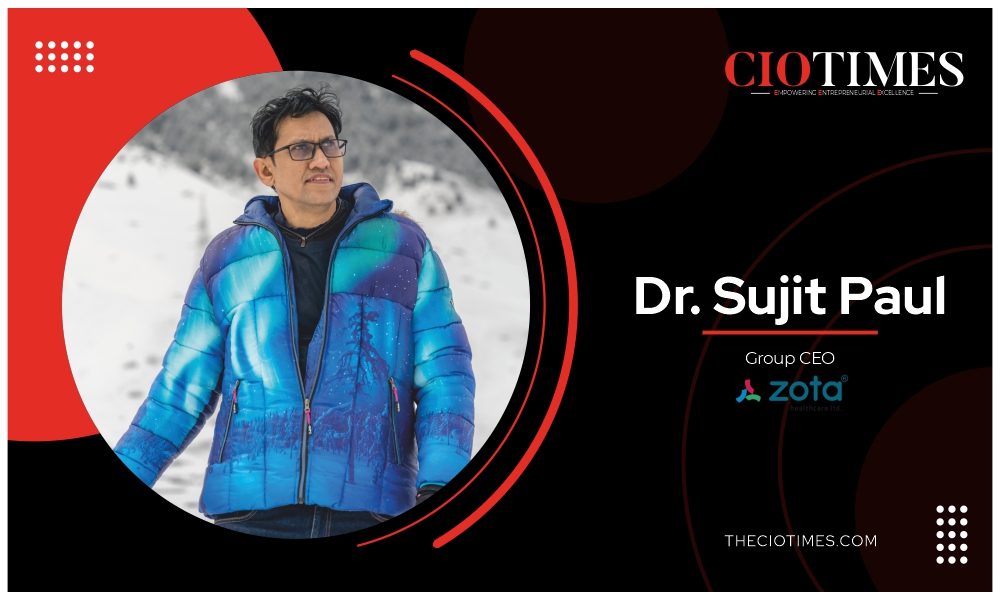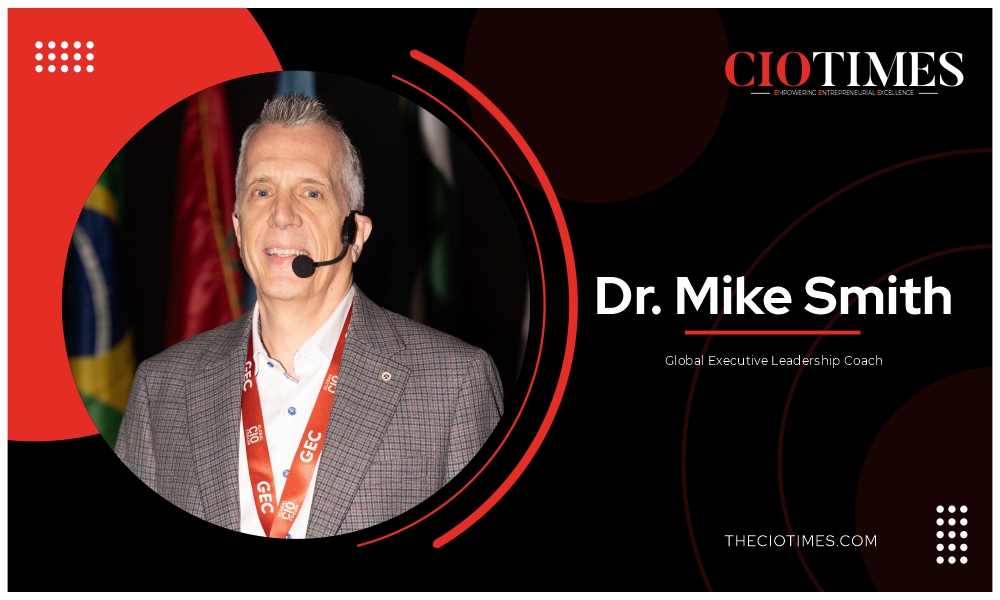The advent of artificial intelligence (AI) has taken the globe by storm. Each sector is levelling up, leveraging the technology efficiently. Deploying it into the human resource realm has only helped organizations hire the right talent. Moustafa El Hadidi, Founder at Qaws, is an epitome of the same. Reflecting on how his professional journey evolved from his early beginnings in network engineering to founding two successful HR technology ventures, he describes a path shaped by curiosity, purpose, and a passion for human potential.
He began his career with eight years in IT Security, where he cultivated a disciplined, analytical mindset and a deep appreciation for systematic problem-solving. During this period, he also authored his first book, an experience that reinforced his belief in knowledge-sharing as a key driver of growth and innovation. Over time, however, Moustafa realized that while technology could solve complex technical challenges, its true power emerged when used to empower people to achieve their best.
His move into Human Resources was therefore a conscious and strategic decision, not a coincidence. He viewed HR as the true meeting point between personal ambition and organizational success. Observing that traditional HR approaches often failed to unlock human potential or design meaningful career journeys, he saw an opportunity to reshape the way talent and opportunity connect.
What ultimately motivated Moustafa to enter the HR innovation space was witnessing a persistent disconnect: highly capable professionals struggled to showcase their abilities, while organizations faced difficulty identifying the right talent. He believed that technology, especially AI, could bridge this gap through transparent, fair, and intelligent systems that serve both individuals and employers. This conviction became his mission: to transform recruitment from a transactional process into a transformative experience that creates livelihoods, not just jobs.
Empowering Potential
About his core mission, Moustafa highlights that as a serial entrepreneur bridging technology and human potential, having founded both SAmAS Gamify and QAWS, he describes it as a journey of purpose and empowerment.
At the heart of his mission is a simple belief: opportunity should be accessible to everyone. He sees technology as a bridge that can uncover and nurture the unique potential within every individual. Too often, traditional systems overlook talent or fail to provide the right environment for growth, and that realization has guided much of his entrepreneurial path.
Through his ventures, he has come to view himself as an architect of opportunity. With SAmAS Gamify, he discovered how interactive, gamified learning could make personal and professional development more engaging and meaningful. That experience laid the groundwork for QAWS, where he’s leveraging AI to create personalized and transparent systems for talent assessment and career development.
For Moustafa, technology is not about replacing human judgment; it’s about enhancing human potential. His goal is to build platforms that help people showcase their real abilities while giving organizations deeper insights into the talent they engage with. In his view, true innovation happens when technology uplifts people, creating progress that is both human-centered and future-ready.
Cross-Industry Innovation
Moustafa’s cross-industry experience spanning technology, chemicals, pharmaceuticals, and education has played a key role in shaping his approach to business innovation. This diverse background has given him a well-rounded perspective on how various sectors cultivate talent, foster innovation, and sustain growth.
Each industry, he notes, has offered distinct lessons that now guide his leadership in building global HR platforms. From the technology sector, he learned the value of scalability and the principles of intuitive user experience that remain central to his product design philosophy. His time in the pharmaceutical industry emphasized the importance of regulatory compliance and quality assurance, lessons that now influence QAWS’s rigorous focus on data security and ethical AI. The chemicals sector reinforced the necessity of safety and precision, concepts he has embedded into the company’s assessment methodologies. Meanwhile, the education field underscored the need for continuous, personalized learning as the foundation for sustainable talent growth.
Moustafa’s cross-industry background enables him to appreciate the distinct challenges each sector faces in identifying, developing, and retaining talent. This understanding shapes how QAWS designs its frameworks, integrating sector-specific needs while upholding consistency, quality, and reliability across industries. Ultimately, this multifaceted experience allows him to approach business innovation not just from a technological standpoint but through a deep understanding of people, purpose, and performance.
Transforming Talent Discovery
When asked what inspired the creation of QAWS and how it is redefining AI-powered recruitment in Saudi Arabia and beyond, Moustafa explains that the idea emerged from a clear observation that the traditional recruitment process had become increasingly inefficient and opaque, leaving both candidates and employers dissatisfied. He often saw talented professionals struggle to prove their capabilities through conventional methods, while organizations made hiring decisions based on incomplete or inconsistent information.
The turning point came when Saudi Arabia’s Vision 2030 highlighted a national opportunity to transform recruitment infrastructure in alignment with the Kingdom’s economic diversification goals. With the growing demand for skilled talent across emerging industries and a young, ambitious workforce ready to contribute, Moustafa recognized the potential for AI-driven innovation to reshape how talent is discovered and developed.
QAWS is redefining recruitment by shifting the focus from academic credentials to demonstrated capabilities. The platform leverages AI to deliver holistic assessments that measure not only technical expertise but also soft skills, cultural alignment, and growth potential. Candidates receive personalized feedback and development pathways, turning what was once a rejection into an opportunity for growth and redirection.
What truly distinguishes QAWS is its alignment with national standards. It is the only platform in Saudi Arabia that integrates skills assessments with the Ministry of Human Resources’ guidelines, ensuring that evaluations are both rigorous and relevant to local market needs, bridging technology, policy, and human potential in a way that supports the Kingdom’s long-term vision.
Empowering Talent Futures
Moustafa shares that QAWS distinguishes itself through a unique blend of national standards alignment, full AI integration, and a commitment to creating value for both candidates and employers. It is the only platform in Saudi Arabia that fully aligns with the Ministry of Human Resources’ guidelines, ensuring that its assessments are not only innovative but also practical, compliant, and tailored to the local market.
Unlike many platforms that use AI in a limited way, QAWS applies it across the entire recruitment journey from psychometric testing and skills evaluation to interview simulations and personalized development planning. This comprehensive approach ensures that candidates are assessed holistically, rather than superficially.
What truly sets QAWS apart, Moustafa emphasizes, is its focus on empowering candidates. While most recruitment solutions prioritize employers, QAWS equally values the candidate experience. Individuals receive detailed feedback, actionable skill development recommendations, and guidance for career growth, transforming hiring from a simple evaluation into a meaningful journey of development.
Aligned with Vision 2030, QAWS also supports key national priorities by building the digital infrastructure needed for economic diversification and bridging the education-to-employment gap. Through this approach, the platform not only connects talent with opportunity but also contributes to the Kingdom’s broader vision of sustainable growth, human capital development, and innovation.
Balanced Hiring Process
Moustafa explains that the key to effective AI-driven recruitment lies in finding the right balance between automation and human judgment, leveraging the strengths of each while ensuring that final decisions remain in human hands. AI excels at processing large volumes of data, uncovering patterns, and reducing unconscious bias, whereas humans bring contextual understanding, emotional intelligence, and strategic insight to the hiring process.
At QAWS, AI handles the analytical heavy lifting, including skills assessment, credential verification, and initial candidate screening. This approach allows human recruiters to focus on higher-value activities such as evaluating cultural fit, planning strategic roles, and nurturing candidate relationships. Simply put, AI provides the data, while humans provide the wisdom.
He emphasizes that automation should enhance rather than replace human judgment. QAWS generates detailed candidate profiles enriched with AI-driven insights, yet the ultimate hiring decision remains with human managers. These managers can weigh factors such as team dynamics, company culture, and long-term strategic objectives, elements that AI, despite its analytical power, cannot fully capture.
This philosophy, Moustafa notes, ensures that recruitment is both efficient and human-centered, blending technology and judgment to create a process that is fair, insightful, and aligned with organizational goals.
Courageous Transition
Moustafa reflects that one of the most challenging decisions in his career was transitioning from a successful IT Security role to enter the HR space with his first startup. This move was not merely a career change; it required leaving behind established expertise, professional networks, and financial stability to pursue an uncertain vision in a new and unfamiliar industry.
He explains that this experience highlighted a key principle of effective leadership: making decisions that may feel uncomfortable in the short term but are aligned with long-term vision and core values. It reinforced his belief that creating meaningful impact often involves stepping away from safe, proven paths to explore uncharted territory.
The transition also taught him the importance of intellectual humility and the willingness to “unlearn” strategies that had been successful in other contexts. Today, these lessons shape how Moustafa approaches new challenges and guide his leadership style, encouraging his team to view uncertainty not as a risk, but as an opportunity for learning, growth, and innovation.
Seamless Integration
Moustafa explains that many organizations struggle to integrate new HR technologies because traditional platforms often demand a complete overhaul of existing processes. QAWS approaches this challenge differently, prioritizing compatibility and gradual adoption rather than forcing wholesale replacement.
The platform seamlessly integrates with existing HR systems using standard APIs and data formats, enabling organizations to incorporate its assessments into their current workflows with minimal disruption. It offers flexible implementation options, ranging from standalone assessments to fully integrated talent management solutions, ensuring a smooth and adaptable transformation process.
To maintain data accuracy, it employs multiple verification layers, including blockchain-inspired credential validation and AI-powered fraud detection. Decision quality is strengthened through a comprehensive reporting system that translates complex assessment data into actionable insights, allowing organizations to make informed, strategic talent decisions without compromising efficiency or reliability.
Empowered Leadership Approach
Moustafa describes his leadership philosophy as one rooted in strategic empowerment rather than micromanagement. He believes that the most effective teams are those that understand their purpose and have the autonomy to pursue it creatively. His role is to provide a clear vision, remove obstacles, and ensure that team members have the resources and support necessary to excel.
Communication plays a central role in this approach. He emphasizes transparency and context-sharing, making sure that team members understand not only what they are doing but also why it matters. Moustafa notes that transitioning from corporate to startup environments required him to “unlearn” many traditional management practices to better suit agile and innovative teams.
While he remains closely involved in strategic decisions, he maintains open channels for guidance, focusing on being available without being intrusive. His approach is to offer support without fostering dependency, allowing his teams to take ownership while ensuring they have the direction and resources needed to succeed.
Strategic Scaling Insights
Moustafa shares that his experience with SAmAS Gamify provided several critical lessons that directly inform QAWS’s strategic approach. First and foremost, he learned the value of user engagement over feature complexity. Lasting adoption, he explains, comes from creating genuinely meaningful user experiences rather than relying solely on advanced technical capabilities.
This insight shaped QAWS’s emphasis on candidate empowerment. Instead of developing a platform that only serves employers, the team ensures that candidates gain immediate value through personalized feedback and development guidance, making the experience beneficial for all stakeholders.
Additionally, scaling SAmAS Gamify internationally underscored the importance of strong partnerships and local expertise. For QAWS, this translates into strategic collaborations with universities and alignment with national standards. By building from within the local ecosystem rather than imposing external solutions, the platform is designed to deliver both relevance and sustainable impact in the Saudi market and beyond.
Talent Transformation
Moustafa shares a representative example while maintaining strict confidentiality regarding specific client details. A mid-sized technology company was facing high turnover in technical roles, trapped in a cycle of hiring, training, and losing employees within 18 months.
To address this, QAWS implemented a comprehensive assessment strategy that evaluated not only technical skills but also learning agility, cultural alignment, and long-term career aspirations. The AI-driven platform identified candidates who might not have had perfect resumes but demonstrated strong potential for growth and retention.
Within six months, the company experienced a 60% reduction in early-stage turnover, along with notable improvements in team performance metrics. The success stemmed from shifting the focus from hiring for immediate needs to hiring for long-term potential, effectively transforming recruitment from a cost center into a strategic advantage for the organization.
Humanized Analytics
Moustafa observes that the convergence of AI, predictive analytics, and gamification is opening unprecedented opportunities to personalize and elevate every aspect of the employee experience. He envisions a future where HR becomes predictive and proactive, rather than merely reactive.
According to him, AI will enable hyper-personalized career development by analyzing individual learning patterns, performance data, and career aspirations to create tailored growth pathways. Predictive analytics will allow organizations to anticipate talent needs, identify high-potential employees, and address potential turnover before it occurs.
Gamification, he notes, will reshape skill development and performance management by creating continuous, engaging experiences that make professional growth feel like personal achievement.
Moustafa emphasizes that the critical factor is ensuring these technologies enhance rather than replace human connection. In his view, the future of HR will be both more data-driven and more human-centered, combining technological insight with genuine care for employee growth and engagement.
Smart Human Engagement
Moustafa notes that the convergence of AI, predictive analytics, and gamification is creating unprecedented opportunities to personalize and elevate every aspect of the employee experience. He envisions a future in which HR becomes truly predictive and proactive, rather than reactive.
He explains that AI will enable hyper-personalized career development by analyzing individual learning patterns, performance data, and career aspirations to design tailored growth pathways. Predictive analytics, he adds, will allow organizations to anticipate talent needs, identify high-potential employees, and address potential turnover before it occurs.
Gamification, according to Moustafa, will redefine approaches to skill development and performance management by creating continuous, engaging experiences that make professional growth feel like personal achievement.
He emphasizes that the essential factor is ensuring these technologies enhance rather than replace human connection. In his view, the future of HR will be both more data-driven and more human-centered, combining technological insight with genuine attention to employee growth and engagement.
Future Envisioning
Moustafa envisions QAWS as the global standard for AI-powered talent assessment, enabling individuals to realize their potential while giving organizations the insights to build exceptional teams.
Over the next decade, he sees QAWS evolving into a full career development ecosystem, offering continuous learning, skill gap analysis, and optimized career pathways throughout professional journeys.
He anticipates a global shift toward skills-based economies, where capabilities matter more than traditional credentials, and QAWS will provide the infrastructure to identify, verify, and develop these skills at scale.
Committed to democratizing opportunity, Moustafa emphasizes making high-quality assessment and development tools accessible to all, regardless of location or background. His vision is a future where technology amplifies human potential, empowering every individual to contribute meaningfully to society.




